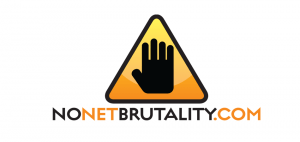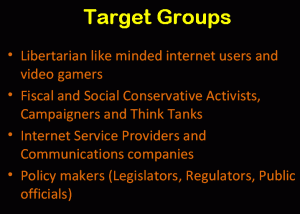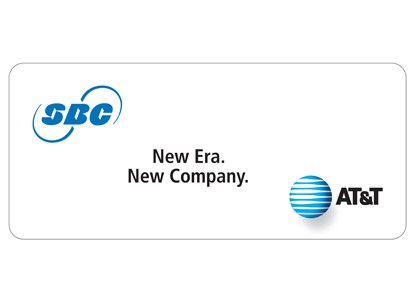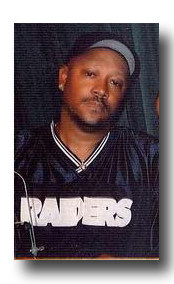
NoNetBrutality characterizes itself as a "grassroots campaign," but new evidence suggests it's actually just another telecom industry-backed astroturf group pretending to represent consumer interests.
On April 12th, a new voice joined the opposition to Net Neutrality reforms. That was the date someone registered the domain name NoNetBrutality.com. Just a few short days later, the group launched a basic website with a mission:
NoNetBrutality.com is a grassroots campaign with a triple mission. It seeks:
(1) to raise public awareness for the imminent threat of government take-over of the internet,
(2) to bring all net neutrality opponents together under one common banner,
(3) to petition the FCC not to go ahead with its attempts to regulate the internet.NoNetBrutality.com was initiated by six liberty-minded activists from six different countries who fear that the current attempts of the U.S. government to restrict access to the internet might soon be followed by other governments if we don’t fight these flawed and dangerous ideas now – before they take root elsewhere.
The NoNetBrutality.com campaign was created by Kristin McMurray (United States), Yolanda Talavera (Nicaragua), Vincent De Roeck (Belgium), David MacLean (Canada), Huafang Li (China) and Aykhan Nasibli (Azerbaidjan), and formally launched in Washington D.C. on April 14th, 2010.
The group’s talking points about Net Neutrality are eerily in lockstep with those distributed by large phone and cable interests who oppose net freedom:
- Net neutrality will take away incentives to invest and innovate – that means the internet will stop improving. Do you really want an internet czar to run the worldwide web and bureaucrats in charge of cyberspace?
- Net neutrality will literally put the internet in “neutral.” Demand for Youtube, Bittorrent and streaming will grow, but who will pay for additional bandwidth if they aren’t allowed to charge for it anymore? Less options and less freedom for the consumers will be the ultimate consequence of these flawed ideas.
- The FCC and others aim to regulate the internet in the same way as they control the television… There’s the real censorship! What will be the next step? Once the government has the mechanism in place to restrict internet access and to set prices, it is only a tiny step towards content control and taxes on internet use.
- Everybody agrees that the internet is a resounding free market success story. If it isn’t broken, why fix it?
You know what that means — that “grassroots campaign” is in reality yet another corporate-backed astroturf campaign desperately trying to hide its true backer — the telecommunications industry.
Here’s what NoNetBrutality left out of its “facts”:
- YouTube is owned by Google, which is a strong believer in Net Neutrality.
- No online service has suffered more at the hands of Internet Service Providers’ throttles than Bittorrent. Net Neutrality would ban those throttles.
- The group ignores the multi-billion dollars in profit the broadband industry earns today from Internet service that is increasing in price at the same time costs to provide it are rapidly falling.
- The FCC proposes no content controls for broadband — only consumer protections to prohibit providers from manipulating broadband traffic for money.
- Everyone does not agree that the Internet is a “resounding free market success story.” In fact, the United States has lost its former lead on Internet speed and adoption, and today is still dropping. We now have worse service than many Asian and East European countries, and providers are trying to test new Internet Overcharging schemes t0 limit consumption and increase prices even higher. That’s success? Only for them.
So who is NoNetBrutality.com and Kristin McMurray, the American creator of the campaign?

McMurray's day job is to develop and run social media campaigns for corporate interests seeking to build support for their public policy agenda
Kristin McMurray is a social media strategist — a hired gun for corporate interests that want social-network-street-cred but don’t exactly know how to create an authentic-looking campaign that fulfills their corporate agenda.
McMurray has a history with corporate-backed conservative think tanks, particularly Americans for Limited Government, a group the nonpartisan Center for Public Integrity reports is 99 percent funded by three unnamed sources. The group has routinely denied requests to identify where their backing comes from. She also was hired to run a campaign for a climate change denial group.
McMurray tracks her site visitors carefully with Alterian’s SM2, a social media monitoring and analysis solution designed for PR and Marketing professionals. Alterian SM2 “helps you track conversations, review positive/negative sentiment for your brand, clients, competitors and partners across social media channels such as blogs, wikis, micro-blogs, social networks, video/photo sharing sites and real-time alerts.”
Grassroots this isn’t.
Accidental Evidence: The Consequences of An Exposed PowerPoint Presentation
Someone left their PowerPoint slides laying around for anyone to pick up and review. That turned out to be about as foolish as the guy who left his field test version of Apple’s newest iPhone in a bar.
Now the truth can be told.
Think Progress managed to obtain a copy of the presentation, and it says quite a bit about just how much grassroots are actually growing at NoNetBrutality.com. Let’s put it this way, if you were allergic to actual grass, you’d have no problems at all rolling around in NoNetBrutality’s astroturf.
It turns out NoNetBrutality is the creature of the Atlas Economic Research Foundation and Grover Norquist’s Americans for Tax Reform, itself heavily backed by corporate interests.
And you thought it was “six liberty-minded activists from six different countries.” Not so much.
Atlas, which counts among its proud moments a corporate strategy to protect Big Tobacco, helps corporations coordinate their front group strategies. Norquist takes corporate agendas and spins them into grass roots efforts in return for money. He was caught up in the Jack Abramoff scandal when the disgraced lobbyist promised one of Norquist’s front groups $50,000 in exchange for “grassroots” support.
Of course, you aren’t supposed to know any of this. Groups like NoNetBrutality are designed to hide their true ties and claim they are run by ordinary concerned citizens making their individual voices heard. Too bad that PowerPoint presentation blew the lid off by telling a much different story.
Net Neutrality is like what China does: “Putting policemen on every corner, on the street or on the Internet.” — Grover Norquist
Norquist’s bizarre interpretation of Net Neutrality shines through in NoNetBrutality’s own campaign. On one of the PowerPoint slides, NoNetBrutality even cooks up a Chinese blog to underline Norquist’s world view that Net Neutrality can be compared with Chinese government censorship.
Every astroturf group has a target audience. NoNetBrutality is no different:
Target Groups
- Libertarian like minded Internet users and video gamers
- Fiscal and Social Conservative Activists, Campaigners and Think Tanks
- Internet Service Providers and Communications companies
- Policy makers (Legislators, Regulators, Public officials)
For groups like NoNetBrutality, getting corporate and conservative support means being a cog in the wheel at Grover’s infamous Wednesday strategy sessions. One of the PowerPoint slides calls attention to just how important these meetings are in the effort to coordinate opposition to consumer-friendly broadband reform.
Now that the cat is out of the bag, outraged consumers have invaded the group’s primary social media outlets. Their Facebook page is now loaded with comments from those upset about the fact the entire effort is little more than another bought-and-paid-for deception effort from the telecom industry. Twitter is now used more to expose the group than to promote it.
The ironic part is that the very group that seems so alarmed by the prospect of “government censorship of the Internet” has no problems censoring its own Facebook page to remove posts that it determines are “off topic” or “not polite.”
<
p style=”text-align: center;”>
[Update Wednesday 3:20pm — This “group” came out of the closet this morning as a “class project” funded by Atlas, and attacked Think Progress for overreaching as to the group’s own importance in the Net Neutrality debate. You can read my extended thoughts on today’s developments in the Comments section. In short, I think today’s revelations may actually do even more damage to their credibility than earlier thought. What does it say about a group of people willing to attend a “school” (and the “school” itself) that actively teaches how to develop and launch highly-deceptive fake grassroots campaigns designed to fool consumers? Today they are downplaying the entire affair as “funny,” but if you were a visitor to their website, would you be laughing to learn the group isn’t really run by “six liberty-minded activists from six different countries” but rather those budding to learn the craft of sock-puppetry?
I think it’s sad some people have a moral code that says intentional deception in a public policy fight is just fine. When you lie to your supporters and opponents about who you really are, and then say it’s “funny” when you come clean later, they are left with little more than to ponder whether you were lying to them then or lying to them now.]


 Subscribe
Subscribe




